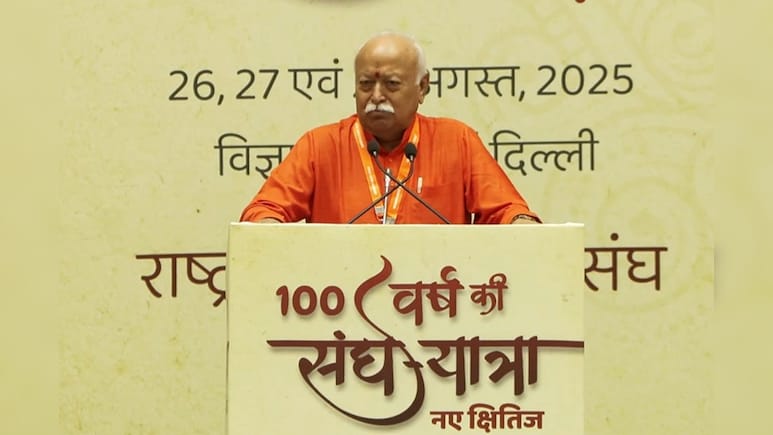
Rashtriya Swayamsevak Sangh (RSS) chief Mohan Bhagwat on Tuesday used the organisation's centenary celebrations to deliver an address that combined history, cultural identity, and a vision for India's global role.
Mr Bhagwat delved on the similarities among identities built around "bharatiya," "hindu" "sanatani", saying they are all similar, and denote commitment to the motherland. He said for the RSS no one was an enemy or friend. "People who opposed us in the past are with us today...even in the past we never considered them opponents. We have only love and devotion for the society."
India's civilisational ethos, said Mr Bhagwat, gives it a unique responsibility to lead the world as Vishwaguru (global teacher), while urging a return to core values of harmony and self-reliance.
"The time for India's contribution to the world has come," Mr Bhagwat said, arguing that the Sangh's 100-year journey was rooted in preparing society for that role.
Citing Swami Vivekananda, he said every nation has a mission and India's is to guide the world towards prosperity and balance. "If we are to become Vishwaguru, it is not for our glory, but for the good of the world," he stressed.
Shared DNA, Common Culture
Mr Bhagwat, 74, repeatedly turned to India's deep civilisational continuity to make his point about unity. "The DNA of people in undivided India has been the same for 40,000 years," he said, underlining that identity is not determined by caste or religion but by shared heritage.
"Living in harmony is our culture," he declared, adding that this inclusive outlook has allowed India to withstand invasions and turmoil through centuries.
Defining Hindu identity in broader terms, Mr Bhagwat clarified that the concept of Hindu Rashtra was not tied to political power. "It has nothing to do with authority. It is about justice and inclusion for all," he said, calling Hindu culture a framework of consensus and coexistence.
Freedom Struggles and Political Awakening
Marking the centenary against the backdrop of the country's independence struggle, Mr Bhagwat recalled the 1857 revolt as the first great spark of resistance. "The 1857 war of independence awakened consciousness in the country," he said. But he also cautioned that military resistance alone was not enough. "It is not enough for soldiers to fight, the common people must understand the value of political freedom."
That course correction, he said, gave rise to the Indian National Congress and a broader political awakening. Mahatma Gandhi, he added, taught Indians to serve the nation through acts as simple as spinning the charkha, symbolising self-reliance and moral strength.
Mr Bhagwat argued that this blend of political movements and social reforms shaped India's modern identity, though he admitted "not everything is alright even today," pointing to continuing movements that demand a return to civilisational roots.
RSS at 100: Not Control, But Inspiration
On the role of the RSS itself, Mr Bhagwat sought to dispel long-standing criticism that the organisation exerts undue control. "The RSS does not command its volunteers. It inspires them," he said, describing swayamsevaks as ordinary men who live extraordinary lives of service. The Sangh, he stressed, has survived and grown over a century not by decree, but through the commitment of its members at the grassroots.
He urged that discussions about the RSS be "based on facts, not perceptions," noting that many who once opposed the organisation had since come to appreciate its work. The organisation, he said, existed not in opposition to any community but in service of society.
Hedgewar's Legacy
Mr Bhagwat paid tribute to Dr Keshav Baliram Hedgewar, the RSS founder, calling him a "born freedom fighter" whose only thought was the nation. Hedgewar, he said, worked across political, social, and cultural spheres before laying the foundation of the Sangh in 1925 as a vehicle for national regeneration. "His vision was not confined to one organisation but to awakening society as a whole," Mr Bhagwat said.
Future Challenges
While steeped in history, Mr Bhagwat said India's rise as Vishwaguru depends on addressing pressing needs. He called for affordable and inclusive access to quality healthcare and education, warning that prosperity would remain incomplete if basic rights were denied to the poor. He also reiterated the need for cultural revival, including the spread of Sanskrit, and for a stronger embrace of self-reliance in a globalised economy.
Mr Bhagwat concluded by sketching a roadmap rooted in the Sangh's "Panch Parivartan" - five transformations in social harmony, family enlightenment, environmental awareness, selfhood, and civic duty. These, he said, are essential if India is to lead not through power, but through values.
Track Latest News Live on NDTV.com and get news updates from India and around the world

